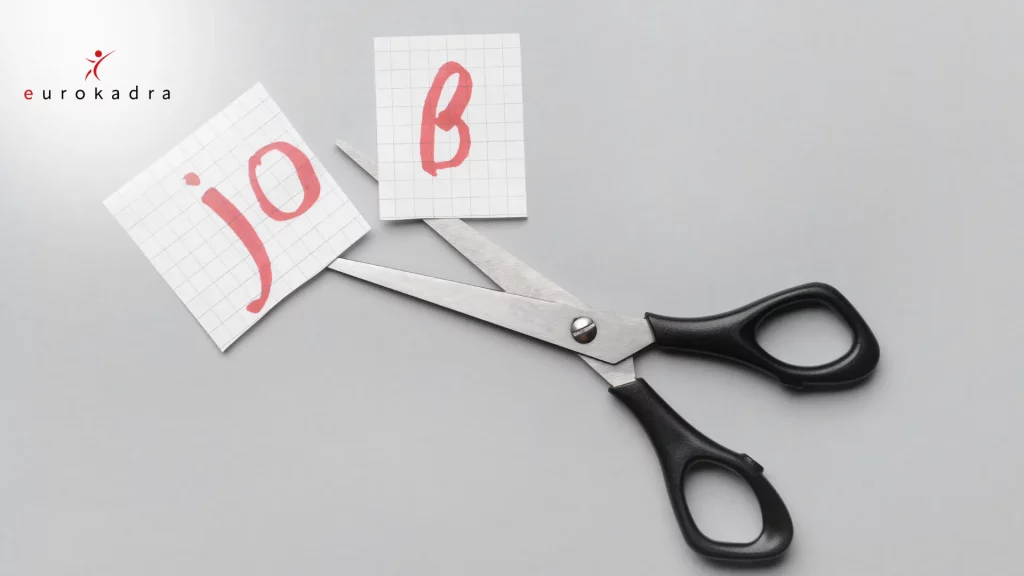Job loss – how to deal with it?
Losing a job can be a difficult event that causes stress and anxiety about financial stability. If it is an unexpected situation, we may feel a sense of regret or even depression after losing our job. How to deal with job loss? How to ensure a good start? Is it possible to prepare for losing your job? How to fight depression after losing your job?

Dismissal from work – what could be the reasons?
Losing a job is an unpleasant experience that can cause many emotions. The reasons for dismissal may be different, but it all depends on the condition of the company and our commitment. The exemption varies depending on the type of employment. If we are employed on a mandate contract, the employer may dismiss us overnight without giving a reason. In the case of an employment contract for an indefinite period, the employer must provide the reason for the dismissal. The same applies to disciplinary dismissal. In other situations there is no such need. What might be the general reasons for dismissal by employers?
- Low employee performance – the employee should perform his duties so that the employer benefits from him. If this does not happen, she has the right to thank him for his cooperation.
- Conflictful nature – a good atmosphere at work depends on the entire team. It strongly influences commitment and motivation to work. However, sometimes there are people who introduce some nervousness through their character. The employer may suffer losses due to such a person who reduces the efficiency of the entire team.
- Tardiness – Employers highly value punctual employees. For them, it is a sign of commitment and respect. You can always count on such an employee and you know what to expect. People who have problems with punctuality may also have difficulty meeting deadlines or completing projects. A simple 15-minute delay of an employee results in as many as 5 hours of absence per month. This generates additional costs for the employer.
- Theft – If an employee steals in the workplace, it may be grounds for dismissal. Theft may be considered as the appropriation of someone else’s property contrary to the contract. This may be using a company car after working hours or taking accessories of low value from the company. The employer then loses trust in the employee, which affects the quality of cooperation. Please remember that theft of items worth up to PLN 500 is a misdemeanor, and if the value exceeds this amount, it is treated as a crime.
- Passive attitude – this is a violation of employee duties. By signing a contract with the employer, the employee undertakes to perform specific duties. If this is not met, the employer has the right to dismiss the employee.
- Organizational culture mismatch – this is a set of company principles and values on the basis of which the employee community should be built. They help maintain coherence, integrate and define the company’s goals. If someone cannot find their way in the company, it is of course not a big offense, but it may be problematic in the long run.
- Long-term incapacity for work – if an employee is unable to perform his or her duties due to an illness that continues for a long time, the employer has the option of terminating cooperation.
- Employment reduction – this is a reason that comes from the employer, usually due to reduced production, reduced demand for products or economic reasons. In such a situation, the employer may be forced to take sick leave.
- Lack of qualifications or skills – when an employee does not have the skills necessary to perform the duties effectively. An employer may decide to dismiss an employee if he or she is unable to meet the requirements of the job.
- Lack of adaptation to changes in the company – companies often have to adapt to the labor market, technological or industry development. An employee who is unable to adapt to new working conditions or the company’s strategy may constitute a burden for the organization.
- Safety Violations – Workplace safety is a priority for every company. If an employee violates safety regulations, it may pose a serious threat to himself, other employees or company property.

Why is losing a job so difficult?
Being laid off from work can cause enormous stress in our lives. We are afraid for our future, and our emotions are raging after losing our job. Many people identify with the company and share the same values as it. After all, we spend most of our lives at work. We may be attached to our responsibilities or to the people we work with. Nowadays, work is not treated only as a source of income, but a place where we can fulfill ourselves and derive satisfaction from it. We lose our established routine, which may negatively affect our well-being. We take dismissal from work very personally and may feel sorry for ourselves or have low self-esteem.
How to react to job loss?
The reaction to job loss may vary depending on the individual characteristics of each person. Each of us has a different temperament, experience and style of dealing with difficult situations. One person will be resistant to stress, while the other may have a problem with it. The reaction also depends on the financial situation; if someone has no stability in life, they may react very nervously to being laid off. Such stress related to job loss is difficult to cope with because it is accompanied by great uncertainty about the future and a sense of lack of control over one’s life.
An employee who has received a notice of termination may feel: sadness, anger, disappointment, stress, and a sense of injustice. In such a situation, however, it is worth remaining calm. You can ask about next steps and the reasons for dismissal. You should accept this news with dignity and not make a big fuss. It’s good to leave a good impression. This proves our self-confidence and professionalism.
What could be the consequences of losing your job?
The emotions associated with losing a job may have a negative impact on our well-being, but also on our physical and mental health. Of course, it all depends on our general health condition and resistance to stress. Experiencing job loss can be very individual. What could be the consequences of losing your job?
- financial uncertainty – losing a source of income can lead to big financial problems. Each of us has some obligations that we must fulfill. The lack of a stable income may make it difficult to pay bills, loan installments, or maintain your standard of living.
- loss of social benefits – when we lose our job, we also lose benefits such as social security and health insurance. We may have trouble taking advantage of free health care, and no days are added to our length of service.
- social isolation – the workplace is also often a place where we establish social relationships. Losing a job can lead to social isolation, especially if the job loss is coupled with a change in the social environment.
- health problems – the stress of losing a job can affect your mental and physical health. Depression, nervous breakdown, anxiety, insomnia and other health problems may be a consequence of difficulties related to unemployment.
- Difficulty finding a job – The process of looking for a new job can be difficult, especially when the job market is competitive. A long period of unemployment may make it difficult to return to the labor market.
- lack of life satisfaction – losing a job can affect your overall life satisfaction. A person without employment may feel a loss of meaning in professional and personal life.
Unemployment benefit – who is entitled to it?
Unemployment benefits are available to everyone who has lost their job and is looking for a job. To receive unemployment benefits, you must meet several conditions:
- registration at the employment office,
- have worked for at least one year,
- demonstrate that you have worked for at least 365 days in the 18 months preceding registration at the labor office as an unemployed person,
- demonstrate that you received at least the minimum wage for your previous work,
- not have any job offer from the employment office.

Severance pay after losing your job
There is no mention of severance pay after losing a job in the Labor Code. The rules for granting them are detailed in the Act on special rules for terminating employment relationships with employees for reasons not attributable to employees. In the event of group dismissal, you are entitled to severance pay in the amount of:
- one month’s remuneration if the employee has been employed by a given employer for less than 2 years;
- two months’ salary if the employee has been employed by a given employer for 2 to 8 years;
- three months’ remuneration if the employee has been employed by a given employer for more than 8 years
Is it possible to prepare for losing your job?
It is impossible to predict a situation in which we will be fired if no one mentions planned layoffs. If we do our job well and have nothing to reproach ourselves with, we can feel stable in the workplace. Regardless of how we feel in the company, it is always worth being ready for such a situation to happen. It is worth refreshing your CV from time to time. You can also develop your profiles in social media, e.g. on Linkedin, to be ready for possible offers. It’s good to build a network of contacts around yourself, and if you lose your job, it will be easier to find something new.
Losing your job – how to cope?
Loss can be a difficult and stressful experience that will negatively impact our well-being. How to cope after losing your job?
- Allow yourself to feel emotions – losing a job can trigger a lot of emotions in us, which, if accumulated, can have very unpleasant consequences for us. Allow yourself to experience these feelings and over time you will feel better. Choose to rest after losing your job. Don’t go to extremes. Allow yourself to relax and then create an action plan.
- Assess your financial situation – calculate how much you have in savings and how long you can survive without income.
- Create an action plan – it will be easier for you to find a new job if you set your professional goals and the areas you will focus on. Plan what you will do and on what day to avoid unnecessary chaos. Analyze your application documents and think about whether you have anything to improve. Think about your skills, maybe there is something you can develop?
- Update your CV – remember that when responding to job offers, you must have an updated CV. See what you can do to improve them. Browse patterns and get inspired! Also remember to include a current GDPR clause in your CV, which allows the employer to review documents and process personal data.
- Develop your skills – use your time without employment to learn new skills or improve the ones you already have. Online courses, training or obtaining certificates can increase your attractiveness on the labor market.
- Don’t get emotionally attached – in the future, try to think realistically and accept the thought that something is there at a given time, and it may not be there next. In the future, try not to become emotionally attached to a given place. A good atmosphere at work, relationships and bonds are necessary, but it must be borne in mind that changes may always come.
Do you want to get a new job? Our employment agency will be happy to help you with this! Check out our current job offers or contact us and give us a chance to find you a new job.
Check also: Disciplinary dismissal – what are the reasons and consequences?
 Back
Back